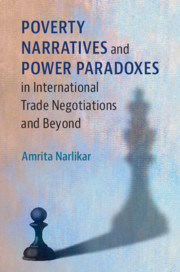Book contents
- Poverty Narratives and Power Paradoxes in International Trade Negotiations and Beyond
- Poverty Narratives and Power Paradoxes in International Trade Negotiations and Beyond
- Copyright page
- Dedication
- Contents
- Acknowledgements
- 1 Introduction
- 2 The Disempowered Many
- 3 Winning against the Odds
- 4 When Fair Is Foul and Foul Is Fair
- 5 Conclusion
- Index
- References
3 - Winning against the Odds
A Growing Empowerment
Published online by Cambridge University Press: 16 April 2020
- Poverty Narratives and Power Paradoxes in International Trade Negotiations and Beyond
- Poverty Narratives and Power Paradoxes in International Trade Negotiations and Beyond
- Copyright page
- Dedication
- Contents
- Acknowledgements
- 1 Introduction
- 2 The Disempowered Many
- 3 Winning against the Odds
- 4 When Fair Is Foul and Foul Is Fair
- 5 Conclusion
- Index
- References
Summary
Around the turn of the century, a change got underway. Poverty came to acquire a new importance in debates on trade. And, against all odds, and increasingly as the rule rather than the exception, David started winning against Goliath. These developments were all the more surprising given that the provisions of the newly-created WTO had, in fact, reduced the development-oriented exceptionalism and flexibilities of the GATT. The central way in which this came about was because stories about the causes of poverty, which gave more credence to exogenous variables and recognized the need for changes in the international rules of the game (rather than only governance patterns within developing countries), entered the mainstream. This chapter traces the remarkable ways in which a new empowerment of the poor emerged in the organization, despite the toughness of the new institutional context. Three landmark WTO negotiations (each of which centred on a ministerial conference) plus the decision-making processes of the organization offer useful comparative insights into the role of a south-led poverty narrative in shaping this change. I also offer further examples in other issue-areas – including climate change, ethical consumerism, and women’s rights – where narratives of powerlessness seemed to be winning.
Keywords
- Type
- Chapter
- Information
- Poverty Narratives and Power Paradoxes in International Trade Negotiations and Beyond , pp. 72 - 124Publisher: Cambridge University PressPrint publication year: 2020

